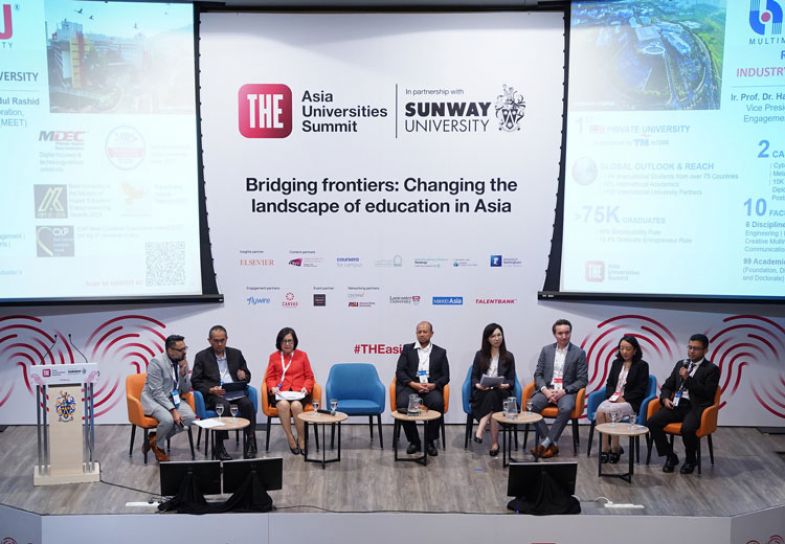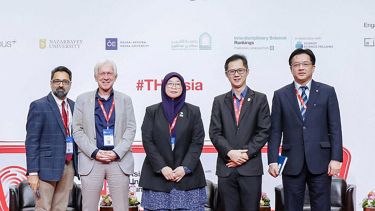
Universities can broaden their expertise and enhance multidisciplinary collaboration by seeking out excellence in partnerships
Strong partnerships empower universities to not only enhance the quality of education but also to contribute to economic development. However, institutions must have a perspicuous blueprint to forge strong collaborations in the region. The Country Pavilions at 2024 THE Asia Universities Summit featured several universities from across Asia – with day two focusing on Malaysia and China –underlining their efforts to achieve the United Nations’ Sustainable Development Goals (SDGs) and bolster collaboration in the region.
“Collaboration is about complementing each other,” said Hairul Azhar Bin Abdul Rashid, vice-president for market exploration, engagement and touchpoint at Multimedia University in Malaysia. Rashid added that universities must foster collaborations to expand their areas of expertise. Multimedia University’s articulation pathway encourages students to study at its partner universities around the world to expand their learning opportunities.
Collaboration will help to expand the scope of research and improve access and student mobility, said Nor Hisham Hamid, deputy vice-chancellor for student affairs at the Universiti Teknologi Petronas in Malaysia. Ahmad Kamal Ariffin, professor in the Department of Mechanical and Manufacturing Engineering at Universiti Kebangsaan in Malaysia, said that collaborators must establish clear channels of communication to complement each other. He added that this empowers universities to contribute to local and national economic development.
Streamlining knowledge and technology transfers can create innovative solutions to overcome real-world problems, the panel agreed. Maggie Ho, senior administrative officer at Macao Polytechnic University’s Academic Affairs Department, said the university developed the world’s first Chinese-Portuguese translation system to bridge linguistic barriers and encourage cultural exchanges and holistic perspectives within its academic community.
Multidisciplinary collaborations can help expand degree programmes and develop curricula, enabling students to build in-demand and sustainable skills. Lim Shui Chin, director of the International Office at Sunway Education Group, outlined Sunway University’s commitment to improving societal impact using the SDG framework. Home to Asia’s Sustainable Development Solutions Network, Sunway University aligns its efforts and academic structures to create environmentally conscious graduates.
Christopher Peter Clarke, senior manager of international communication at the Southern University of Science and Technology in China, said that although internationalisation has been a central pillar in many institutions for years, universities must continue to look for collaborations that can be strengthened. Institutions must also track market shifts and implement strategies to adapt quickly to emerging trends, he said.
The panel:
- Ahmad Kamal Ariffin, professor in the Department of Mechanical and Manufacturing Engineering, Universiti Kebangsaan Malaysia
- Lim Shui Chin, director of the International Office, Sunway Education Group
- Christopher Peter Clarke, senior manager of international communication, Southern University of Science and Technology
- Nor Hisham Hamid, deputy vice-chancellor for student affairs, Universiti Teknologi Petronas
- Maggie Ho, senior administrative officer, Academic Affairs Department, Macao Polytechnic University
- Bhavit Mehta, senior content manager for APAC, Times Higher Education (chair)
- Hairul Azhar Bin Abdul Rashid, vice-president for market exploration, engagement and touchpoint, Multimedia University
- Yating Yang, vice-dean, Law School, Tianjin University
Find out more about the Country Pavilions at THE Asia Universities Summit.


